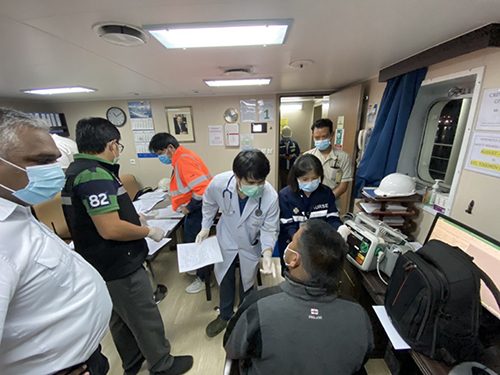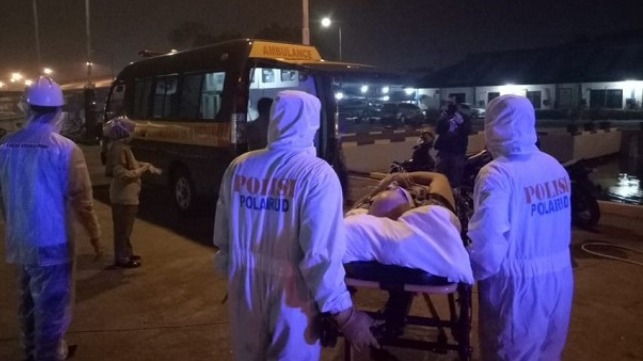You are here
Atty. Dennis Gorecho: The escrow provision and the legal battle for seafarer’s compensation
The escrow provision and the legal battle for seafarer’s compensation
Atty. Dennis Gorecho May 26, 2023 https://businessmirror.com.ph/2023/05/26/the-escrow-provision-and-the-le...
The current debate on the escrow provision of the pending Magna Carta for Filipino Seafarers basically revolves around ambulance chasing linked with the proliferation of labor cases that pose a threat to international employment.
Employers argue that seafarers seek “benefits even beyond the claims they are actually entitled” to sanitize the problematic legal battle for compensation.
Through restrictive provisions of the POEA (now DMW) seafarers employment contract, claims for disability and death compensation became a legal battleground, especially when seafarers do not receive full compensation they are legally entitled to have.
Such emergence of cases is attributable to the fact that the seafarer’s employer does not hesitate to harness its immense resources to limit its liability. The contract is not really reflective of the benefits that should be given to the seafarer based on the grading system.
There are medical conditions that are classified as partial disability (between Grade 2 to 14), but in essence should have been considered as total permanent (Grade 1).
Employers will never hire a seafarer who suffered complete loss of the sense of hearing on both ears (Grade 3), or loss of two external ears (Grade 8), or loss of speech due to injury to the vocal cord (Grade 3), or complete loss of the sense of hearing in one ear (Grade 11) as this will create problems in communication among the crew on board the vessel.
A seafarer will no longer be employed due to mobility problems if he suffered total loss of a leg or amputation at or above the knee (Grade 3), or with total paralysis of one upper extremity (Grade 3), or loss of one foot at ankle joint or above (Grade 6), or total loss of a leg or amputation at or above the knee (Grade 3), or paralysis of one lower extremity (Grade 3), or total paralysis of one upper extremity (Grade 3), or amputation of one upper extremity at or above the elbow (Grade 4), or injury to the spinal cord as to make walking impossible without the aid of a pair of crutches (Grade 4).
A seafarer can no longer hold or lift objects, or even do simple jobs for the simple reason that he no longer has grasping powers if he suffered loss of five fingers of one hand (Grade 6), or loss of 10 fingers of both hands (Grade 3), or amputation between wrist and elbow joint (Grade 5), or amputation of a hand at carpo-metacarpal joints (Grade 5).
A seafarer with visual impairments will never be employed if he is diagnosed to have total blindness of one eye and 50 percent loss of vision of the other eye (Grade 5), or loss of one eye or total blindness of one eye (Grade 7).
Other medical conditions include severe disfigurement of the face or head as to make the worker so repulsive as to greatly handicap him in securing or retaining (Grade 2), or such injury to the throat as necessitates the wearing of a tracheal tube (Grade 6).
Fit-to-work certifications are given even to seafarers who are still not cured or in essence can no longer be employed such as those who suffered from heart attacks, aneurism or stroke.
Employers cannot deny the fact that a seafarer suffering from any of these medical conditions will be considered more of a liability than an asset if he is allowed to go on board the vessel. He would no longer be able to perform strenuous activities such as the rigorous duties of a seafarer.
In disability compensation, “it is not the injury which is compensated, but rather it is the incapacity to work resulting in the impairment of one’s earning capacity. Permanent total disability means disablement of an employee to earn wages in the same kind of work, or work of similar nature that he was trained for or accustomed to perform, or any kind of work that a person of his mentality and attainment could do. Disability need not render the seafarer absolutely helpless or feeble to be compensable; it is enough that it incapacitates to perform his customary work.” (Valenzona v. Fair Shipping Corp, 659 SCRA 642)
It does not mean state of absolute helplessness but inability to do substantially all material acts necessary to the prosecution of a gainful occupation without serious discomfort or pain and without material injury or danger to life. ( Seagull Maritime v. Dee 520 SCRA 109)
In the case of Balatero v. Senator Crewing Inc. (GR 198501 January 30, 2013), the Supreme Court explained that indeed, under POEA contract, only those injuries or disabilities that are classified as Grade 1 may be considered as total and permanent. However, if those injuries or disabilities with a disability grading from 2 to 14, hence, partial and permanent, would incapacitate a seafarer from performing his usual sea duties for a period of more than 120 or 240 days, depending on the need for further medical treatment, then he is, under legal contemplation, totally and permanently disabled.
ICMA and familiarization of the culture of Filipino seafarers
ATTY. DENNIS GORECHO | February 28,2023 - https://cebudailynews.inquirer.net/491126/icma-and-familiarization-of-th...
Unlike land-based Overseas Filipino Workers (OFWs), a Filipino seafarer is required to make an allotment which shall be at least 80 percent of the seafarer’s monthly basic salary, payable once a month to his designated allottee in the Philippines.
The issue of seafarers remittances as mandatory while it is only voluntary for the land based OFWs was raised during the second “AHOY Training and Immersion Course” organized by the International Christian Maritime Association (ICMA) held from Feb. 20 to 25, 2023 in Pasay.
ICMA is a free association of 29 charitable organizations working for the welfare of seafarers, fishers and their families. These organizations represent various Christian churches and communities that operate in more than 400 seafarers’ centers in more than 100 countries.
ICMA was founded in 1969 to encourage collaboration and mutual assistance among seafarers’ ministry organizations.
It is the mission of ICMA to promote unity, peace and tolerance as it is the duty of every chaplains, ship visitors, and volunteers and advocates for seafarers’ welfare to serve the stakeholders regardless of nationality, religion, culture, gender or ethnic origin.
Due to the high number of Filipino seafarers who visit port based welfare centers around the world, the training course allowed participants to gain a first-hand knowledge of Filipino seafarers’ social and cultural background and other institutions in the Filipino maritime sector so as to better serve them.
Some of the members organizations of ICMA include Stella Maris, Mission to Seafarers, Sailor Society, German Seemannsmission, among others. Lectures were given by seasoned academicians, government representatives and maritime stakeholders along with familiarization tours in Intramuros, Quiapo, dormitories and centers.
I delivered a lecture on the protection of seafarers’ rights dealing with legal issues on disability and death benefits due to illness or accidents as well as illegal dismissal, nonpayment or underpayment of salaries and wages and illegal recruitment.
It is estimated that there is one Filipino seafarer for every four to five crew on board a vessel at any time.
The sea-based sector’s remittance comprises at least 22 percent of the total dollar OFW remittances. Data from the website of the Bangko Sentral ng Pilipinas (BSP) showed the fluctuation in seafarers’ dollar remittances.
The data noted US$6,870,827,000 in 2017; US$6,139,512,000 in 2018; US$6,539,246,000 in 2019; US$6,353,522,000 in 2020; US$6,545,002,000 in 2021; and US$6,715,880,000 in 2022.
From the BSP records since 2017, the sea-based sector’s remittances increased in 2018 by US$731,315,000, then increased in 2019 by US$399,734,000, then decreased in 2020 by US$185,724,000, then increased in 2021 by US$191,480,000, and increased again in US$170.878,000.
In 2022, total OFW remittances amounted to US$32,539,430.00 where US$25,823,550,000 are from land based workers while US$6,715,880,000 are from deployed seafarers.
In terms of deployment, the records from the Department of Migrant Workers (DMW) show that the total number of seafarers deployed overseas reached 376,663 in 2017; 337,502 in 2018; 507,730 in 2019; 217,233 in 2020; and 345, 517 in 2021.
Blogger Fred Uno of MarineCafe.com pointed out in an article that Filipino seafarers are being shortchanged in the conversion of their dollar remittances to pesos as he described such practice as “thievery” in the maritime industry.
Some unscrupulous manning agencies shave off at least one or two pesos from the foreign exchange rate, misleadingly calling the cut as “service charges.”
Some manning agents keep part of the remittances when converting the money to pesos by using an exchange rate that is usually one or two pesos lower than the official BSP rate.
Such tampering with the dollar-to-peso rate, he added, results to the shortchanging of Filipino seafarers since their families receive less than they should in allotments.
These practices are clearly contrary to the letter and spirit of the POEA contract, which says that facilitation by the manning agency of allotments shall be “at no expense to the seafarer, and that “allotments shall be paid to the designated allottee in Philippine currency at the rate of exchange indicated in the credit advice of the local authorized Philippine bank.”
“The seafaring worldview is presupposed by the expression “We’re in the same boat.” Whatever their nationality, religion, culture, gender or ethnic origin might be, they realize that deep within, people are basically the same. Wherever they embark from and disembark at, they are bound to meet other seafaring people like themselves,” says Bishop Ambo David, president of Catholic Bishops’ Conference of the Philippines (CBCP).

